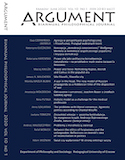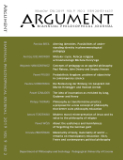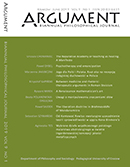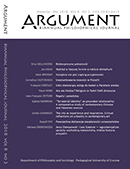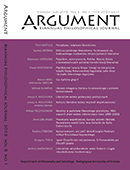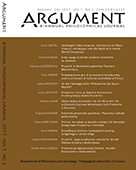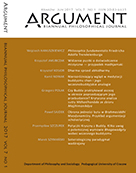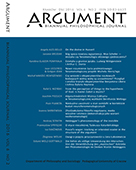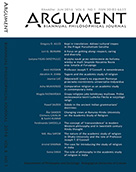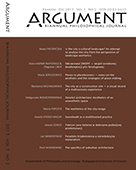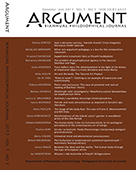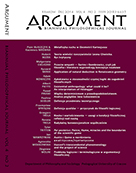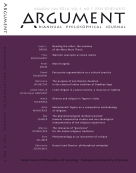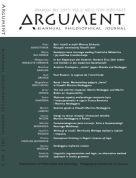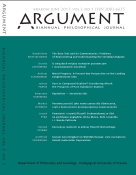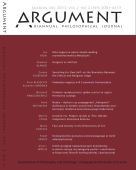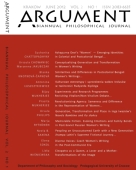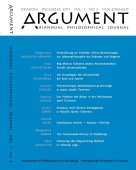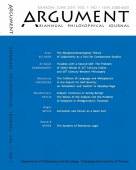DOI 10.24917/20841043.8.1
Kraków, June 2018, volume 8, number 1
SPIS TREŚCI

Temat wiodący tomu:
Polska myśl liberalna
red. Katarzyna Haremska i Paweł Kłoczowski
współpraca Tomasz Borycki

Od Redakcji
Introduction to the issue: Polish liberal thought (Paweł KŁOCZOWSKI & Katarzyna HAREMSKA) (5-7)
Artykuły
Polska tradycja liberalna
Miłowit KUNIŃSKI, Ideowe zmagania Stefana Kisielewskiego z polskim komunizmem (9-26) (DOI 10.24917/20841043.8.1.1)
Abstrakt
Stefan Kisielewski’s intellectual struggle with Polish communism Stefan Kisielewski (1911–1991) a Polish novelist, composer, music critic, essayist, feature writer and a politician, was an exceptional personage in post‑World War II Poland. In his features, published in Tygodnik Powszechny since 1945, in a light, ironic and allusive way to prevent censorship, he described the Polish reality that his readers were acquainted with, in a way that revealed the real causes of the phenomena he observed. The truth was simple: the communist reality was the result of politico‑economic system that was imposed based on a Marxist theory of economy. Kisielewski’s criticism of communism was not just a matter of a keen observation and sensible conclusions; it was based on his studies of Marxism that he began before World War II. In turn, in Wilhelm Röpke’s Die Gesellschaftskrisis der Gegenwart (1942), he found an accurate characterisation of the socialist economy and an explanation for its non‑functioning. The second important reason for his criticism of communism was Kisielewski’s Catholicism, which operated as a counter‑balance to Marxism, combined with the idea of a liberal‑democratic regime. In his later years, Kisielewski criticised the social teachings of the Catholic Church, and suggested a new idea that they were based on “the theology of profit” (a prefiguration of the encyclical Centesimus Annus) as an ideological justification of the attitudes necessary for the functioning of the market economy in Poland. He even suggested the implementation of a dictatorship to avoid long parliamentary democratic procedures, and in this way to establish a quick and effective market economy on the ruins of socialism.
Słowa kluczowe: communism (socialism); totalitarianism; liberalism; capitalism; Catholic Church; Vaticanum II
Miłosz PUCZYDŁOWSKI, ORCID, Katolicy w państwie liberalnego pluralizmu. Miesięcznik Znak wobec sekularyzacji (lata 1989-2000) (27-40) (DOI 10.24917/20841043.8.1.2)
Abstrakt
Catholics in the liberal pluralism state. Facing secularisation in the monthly Znak (1989–2000) The aim of this paper is to analyse the philosophical, sociological, politological, theological and press articles on the issue of secularisation that were published in the monthly Znak during 1989–2000. A definition of secularisation is employed that was coined by Charles Taylor in A secular age (Taylor, 2007). It is understood as the endurance of religion in a plural society. The paper delineates three stands that the Znak Catholics have taken when facing secularisation: (1) an open catholicity; (2) a liberal faith; and (3) an ambiguous one. (1) The first approach involves confronting one’s liberal, secular partners in public debates, with a focus on finding some of their points acceptable according to the Church doctrine. Nevertheless, it is burdened with the anxiety of losing one’s own identity. (2) The second approach emphasises some of the connections between liberal and Christian ideas. A particular meaning of liberty and authenticity in human existence is stressed. (3) In the third approach, although it does not admit to its malevolence, the liberal ideas are treated with sharp criticism. Liberalism is accused of limiting the role of religion in a plural society. In the conclusion to the paper, an attempt is made to present the current relations between liberalism and Christianity in Po‑ land. A deep recent transformation is revealed. It is believed that Znak will lose its function as a continuity sustainer in the next few years.
Słowa kluczowe: secularisation; religion; plurality; Znak
Szymon BRÓDKA, ORCID, Oblicza polskiego liberalizmu: formowanie się krakowskiego środowiska chrześcijańskich liberałów (41-50) (DOI 10.24917/20841043.8.1.3)
Abstrakt
Faces of liberalism: formation of a Christian liberal community in Krakow The aim of the essay is to show the birth of the Kraków liberal community in the years 1977–1980. An attempt is made to reconstruct the main ideological assumptions of the liberal entourage in the context of the opposition activities of Robert Kaczmarek and Mirosław Dzielski. The author refers to the main events occurring in this period, such as the establishment of the Prywatna Inicjatywa Krakowska (Private Cracow Initiative) and the magazine Merkuryusz Krakowski i Światowy, as well as paying special attention to the program texts that were published in it. The article also contains a reconstruction of the debate aimed at classifying the views presented by Mirosław Dzielski.
Słowa kluczowe: Mirosław Dzielski; Robert Kaczmarek; Merkuryusz Krakowski i Światowy; Christian liberalism
Spory o liberalizm
Janusz A. MAJCHEREK, ORCID, Liberalizm wobec polaryzacji politycznych (51-64) (DOI 10.24917/20841043.8.1.4)
Abstrakt
Liberalism and political polarization The customary classification of the ideological doctri‑ nes in democratic systems, which expanded along a left–right axis, is nowadays obsolescent and has been deconstructed. At the same time, the close and strong connection between de‑ mocracy and liberalism, on which the primary model of liberal democracy was established, has been broken in many places of the world. The emerging of illiberal democracies has made the liberal component the main criterion for the classification of contemporary political systems, instead of dividing them into democratic and nondemocratic systems as before. Numerous ideological options could also be classified as being contrary to the liberal one. Liberalism has thus become important in the typologies and analyses of contemporary political systems and ideological options as the opposite to those systems on many new axes.
Słowa kluczowe: illiberal democracy; ideological dichotomies; political pluralism
Piotr BARTULA, ORCID, Przypływy i odpływy liberalizmu (65-82) (DOI 10.24917/20841043.8.1.5)
Abstrakt
Ebbs and flows of liberalism In choosing this subject, I have subscribed to the assumption that political history takes turns, not unlike the alternating rhythms of social change. It turns from faith to the mirage of earthly salvation; from an eschatological war to the susceptibility toward acquiescence; and from ideological animation to the cynical contests for power and one’s own self‑seeking interests. According to this premise, the ideo‑political construction of a liberal micro‑history is curtailed by the growth and withering — the ebb and flow — of the proclivity to freedom.
Słowa kluczowe: liberalism; democracy; ideologia; Aleksander Trzaska Chrząszczewski; economy
Debaty
Marcin KRÓL, Aleksander SMOLAR, Czy byliśmy głupi? (83-98)
Pełny tekst
Janusz A. MAJCHEREK, Andrzej SZAHAJ, Kultura liberalna wobec wyzwań współczesności (99-112)
Pełny tekst
Andrzej WAŚKIEWICZ, Liberalizm–antyliberalizm: wiatr historii i ciągle niezakończona modernizacja (113-118)
Pełny tekst
Artykuły przeglądowe i polemiki
Paweł KŁOCZOWSKI, ORCID, Pięćdziesiąt twarzy Graya. Uwagi na marginesie książki Beaty Polanowskiej-Sygulskiej John Gray i krytyka liberalnego legalizmu (119-128) (DOI 10.24917/20841043.8.1.6)
Słowa kluczowe
political philosophy; liberty; liberalism; value pluralism; value incommensurability; human
rights; human nature; human animal; ecology
Katarzyna HAREMSKA, ORCID, Populizm, autorytaryzm, Polska. Maciej Gdula o konsekwencjach polskiej transformacji liberalnej (129-140) (DOI 10.24917/20841043.8.1.7)
Słowa kluczowe
neo‑authoritarianism; “good change”; Miastko; neoliberalism; left‑wing; social classes
Anna SZKLARSKA, ORCID, Przemiany współczesnej Europy oczami liberała. Rozważania wokół listu Jana Zielonki do Ralfa Dahrendorfa (141-170) (DOI 10.24917/20841043.8.1.8)
Słowa kluczowe
liberalism; European Union; counter‑revolution; Jan Zielonka; politics
Paulina TENDERA, ORCID, Konserwatyzm, ale jaki? Wokół książki Państwo znikąd Bronisława Łagowskiego (171-178) (DOI 10.24917/20841043.8.1.9)
Słowa kluczowe
freedom; liberalism; contemporary art; the state; Poland; distributionism; communism
Grzegorz TRELA, ORCID, Język filozoficznie odczarowany. O Przewodniku po filozofii języka (179-186) (DOI 10.24917/20841043.8.1.10)
Słowa kluczowe
semantics; theory of meaning; pre‑supposition; concrete names; abstraction names
Nauczanie filozofii
Barbara WĄSIK, ORCID, Dziecko filozofem. O projekcie edukacyjnym „FiloZosia – filozofia dla przedszkolaków” (187-204)
Abstrakt
The child as a philosopher. On the educational project FiloZosia — philosophy for pre ‑schoolers The aim of this article is to present the 2015 educational project FiloZosia — Philosophy for pre‑schoolers, which calls upon the natural predilection of children to ‘philosophise”. The author lists different philosophy classes aimed at the youngest learners that were organised in Poland. This serves as a background to the detailed exposition of a project undertaken by the Ph.D. and M.A. students at Cracow’s universities. First, we outline the idea behind FiloZosia, including its general and specific aims. We then go on to discuss the form of these classes, and the thematic fields which provide the topics for FiloZosia meetings. Finally, we provide a sam‑ ple schedule of a class with some methodological and practical tips, as well as the conclusions that we reached after the cycle of meetings was finished. We also aim to disperse the doubts of some teachers and parents, who are afraid of the negative influence such debates could have on the children. Our claim is that well‑conducted discussions will significantly stimulate the intellectual and ethical development of children. We also believe that they have proved to be a valuable tool in honing the communication skills between adults and children.
Słowa kluczowe: philosophy for children; philosophical inquiries; philosophy in kindergarten; philosophy in
the first stage of school education
Okiem filozOFFa
Andrzej CORYELL, Gdyby Bóg istniał… (205-212)
Pełny tekst
Pożegnania i wspomnienia
Beata POLANOWSKA-SYGULSKA, Wspomnienie o Miłowicie Kunińskim (1946-2018) (213-216)
Pełny tekst
Noty recenzyjne
Fareed Zakaria, Przyszłość wolności. Nieliberalna demokracja w Stanach Zjednoczonych i na świecie. Rec. Tomasz BORYCKI (217-218)
Pełny tekst
Mark Lilla, Koniec liberalizmu, jaki znamy. Rec. Tomasz BORYCKI (219-222)
Pełny tekst
George Lakoff, Moralna polityka. Jak myślą liberałowie i konserwatyści. Rec. Tomasz BORYCKI (223-224)
Pełny tekst
Janusz Grygieńć, Colin Tyler (red.), Nowy liberalizm. Wybór tekstów. Rec. Tomasz BORYCKI (225-226)
Pełny tekst
Sprawozdania
Ogólnopolska konferencja naukowa Polska myśl liberalna – tradycja i współczesność. Oprac. Tomasz BORYCKI (227-230)
Pełny tekst
Debata z cyklu „Sztuka myślenia” pt. Koniec liberalnej demokracji. Oprac. Anna SZKLARSKA (231-239)
Pełny tekst
Autorzy tomu (247-248)
Pełny tekst


